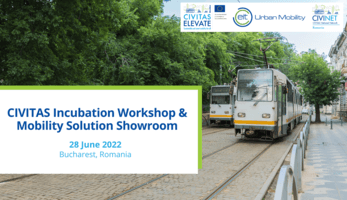Innovative solutions showcased at Urban Mobility Incubation Workshop in Bucharest

Image from Picture provided by Iceberg+ by Marius Apostu, Iceberg+ licensed under Image owned by Iceberg+ and posted with their permission
A recent Incubation Workshop in Bucharest (Romania) – organised by CIVITAS ELEVATE, CIVINET Romania, EIT Urban Mobility, and EIT Urban Mobility RIS Hub Romania (consisting of Iceberg+, Spherik Accelerator, and FZMAUR) – showcased innovative mobility solutions that can help shape the future of mobility implementation. Furthermore, an analysis of the costs and benefits of sustainable urban mobility transition, public-private partnership examples, and the CIVITAS approach were all presented.
The Incubation Workshop explored solutions across diverse mobility aspects in cities. Special attention was paid to smart traffic management and social route design solutions, as well as solutions for ensuring traffic safety, and those that prioritise sustainable development. Finally, real-time mobility data solutions related to shared vehicles, fleets and trips were explored as tool that enable MaaS stakeholders to improve their daily operations and strategic decisions. The provider of this (last) mobility solution emphasised that stakeholders such as cities, public transport operators, car manufacturers, manufacturers, and shared-mobility operators need to make data-driven decisions.
Among the insights from solutions providers include:
- A start-up showed how urban space can be used in a more efficient way, by reducing parking places and instead combining micro mobility, shared mobility, charging infrastructure and logistics in all-in-one urban mobility hubs.
- Electric vehicles (EV) and their infrastructure are increasing in European cities. A new intelligent and agnostic Software as a Service (SaaS) platform was presented as a tool that offers an EV charging ecosystem, which is capable of providing services to all players in the electric mobility ecosystem.
- During the networking sessions, solutions for cycling infrastructure in cities, and an immersive co-design tool for citizen participation and co-creation of public spaces were showcased.
The event, which entailed an introductory session about the incubator concept, a CIVITAS online session, and an EIT Mobility Solutions Showroom, aimed to prepare stakeholders in the field to develop successful interventions that are affordable, feasible, legally possible and self-sustaining in the long term. European cooperation models in the mobility sector were presented, as well as related challenges and opportunities.
The workshop gathered about 40 participants, including representatives of the Ministry of Development, Public Works and Administration, regional development agencies, metropolitan areas, the Polytechnic University of Bucharest (one of the members of the CIVITAS Educational Network), industry, NGOs and more. Among the participants was Mr. Bogdan Cătălin Ghelbere, Deputy Secretary-General of the Romanian Government, who emphasised the importance of innovation initiatives in urban mobility to ensure efficient, smart and sustainable mobility development.
Authors: Uli Lerche, Violeta Mihalache, Alexandra Hîncu








